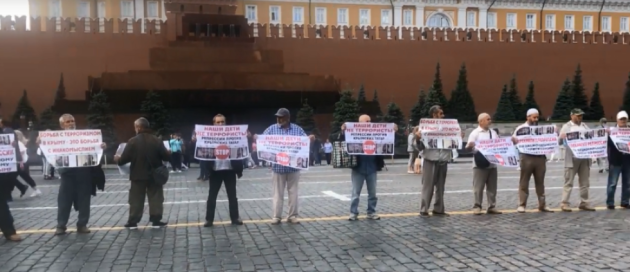Today’s protest action of Crimean Tatars in Moscow’s Red Square is an extraordinary event for both the Russian and Crimean Tatar protest movements. Traditionally, Russian opposition activists (some in defense of Crimean Tatars) have held rallies in Russia, while Crimean Tatars have protested against the violation of their rights either in Crimea, Ukraine or abroad. And now, today, a group of Crimean Tatars unfurled banners protesting against the oppression of their compatriots and relatives right on Red Square.
Of course, they were arrested afterwards, which is not surprising, because the same would happen to any other demonstrators. What is surprising is the uniqueness and extraordinary nature of this situation, despite the original circumstances. Because formally speaking, in the coordinate system of the so-called Russian legislation, the Crimean Tatars are citizens of Russia and therefore have the right to protest in Moscow or any other city in Russia, just like Muscovites or residents of these cities.
People who lived through the years of perestroika should remember that the bright and loud protests of Crimean Tatars in Moscow, fighting for their right to return to their homeland, were one of the signs of the general atmosphere of political awakening in the capital. Of course, today there is no perestroika in the air – we have returned to the most blatant stagnation with elements of Stalinism. But the Crimean Tatars still have to fight for their survival, including through protests. So why not hold them in the capital of the state that forces them to be its citizens?
Protest actions in Moscow and other large cities of Russia are hardly more dangerous for Crimean Tatars than in Crimea itself, which is flooded with security forces. Of course, in response, the authorities there may try to restrict the travel of Crimean Tatars from Crimea to Russia, but this will only provide additional grounds to speak of the violation of their rights. Moreover, such measures will only contribute to the alienation of the loyal or neutral part of the Crimean Tatars from Russia, which objectively serves the interests of the Crimean Tatar national resistance.
One factor that psychologically prevents Crimean Tatar activists from participating in protest activities in Russia may be their identification with Ukrainian, rather than Russian, politics. However, no one is forcing them to renounce Ukraine or to declare that they agree with Russia’s annexation of Crimea. Similarly, members of the Palestinian, Syrian, and other diasporas are not prevented from identifying with their historical homeland while using their citizenship in their host countries to organize actions in support of their compatriots. Ukrainian media, for example, readily covered the protests of Crimean Tatar compatriots as part of the overall struggle for Crimea.
In short, the presence of Crimean Tatars on the political protest field in contemporary Russia would contribute to its further revitalization and draw the attention of both the international community and rational-minded Russians to their problems.

